Silverware, also known as flatware, is a set of utensils used for eating and serving food. From everyday use to formal occasions, silverware is essential to any table setting.
However, not all silverware is created equal, and it is important to consider the health and environmental impact of the materials used in their production.
Using the safest silverware is an excellent way to reduce the risk of harmful chemicals or metals leaching into your food.
Non-toxic kitchen appliances are essential for health-conscious consumers looking to make their homes safer and more sustainable.
In addition to non-toxic silverware, there are other options, such as non-toxic waffle makers and non-toxic cooking utensils, made from eco-friendly materials like stainless steel, titanium, and nickel-free materials.
Understanding the importance of non-toxic kitchen appliances can help you make informed decisions about the products you use in your home. By selecting non-toxic kitchen appliances, you can minimize exposure to harmful chemicals and contribute to a healthier environment.
In addition to being safe and sustainable, non-toxic silverware can also be stylish and elegant. Many brands offer a wide range of designs, colors, and patterns that will complement your dinnerware and add a touch of sophistication to your dining experience.
Silverware can be divided into two main categories: utensils for eating and utensils for serving. Utensils for eating include spoons, forks, and knives, while serving utensils include ladles, serving spoons, tongs, and cake servers.
The advantages of using non-toxic silverware are numerous, and they are safe for human consumption, eco-friendly, and stylish.
Non-toxic silverware is also durable and can last for years when cared for properly. In addition, it can be a more affordable option in the long run, as disposable utensils add up quickly.
One disadvantage of non-toxic silverware is that it can be heavier than disposable options, which may take some getting used to. Some materials, such as wood or bamboo, may also require special care or handwashing to maintain their quality.
With a variety of styles and materials available, you can find the perfect set of non-toxic silverware to complement your dining experience. By choosing non-toxic silverware, you can enjoy your meals with peace of mind, knowing that you are using a safe and eco-friendly utensil.
What is Non-Toxic Silverware?
Non-toxic silverware refers to a set of utensils made of materials safe for human consumption and free from harmful chemicals or metals.
Non-toxic silverware can be made of a variety of materials, such as bamboo, wood, glass, ceramic, and non-toxic metals, such as stainless steel, titanium, or nickel-free alloys.
Why Choose Non-Toxic Silverware?
Choosing non-toxic silverware is an important step in reducing exposure to harmful materials in the kitchen. Non-toxic silverware is typically made of eco-friendly materials, making them a sustainable option for your kitchen.
In addition, non-toxic silverware can be stylish and elegant. Many brands offer a wide range of designs, colors, and patterns that will complement your dinnerware and add a touch of sophistication to your dining experience.
Harmful Chemicals in Traditional Silverware
Traditional silverware often contains harmful chemicals or metals, such as lead or cadmium, which can leach into your food and cause health issues over time.
These harmful chemicals and metals can also have negative environmental impacts, as they can leach into the soil and water supply when the silverware is disposed of.
By choosing non-toxic silverware, you can reduce exposure to harmful chemicals like BPA, Perfluoroalkyl Substances (PFAS) and Phthalates and metals while supporting environmentally friendly practices.
Best Materials for Non-Toxic Silverware
When it comes to non-toxic silverware, there are several materials to choose from. These materials not only provide safety but also offer unique styles and designs to match your kitchen décor. Here are some of the best materials for non-toxic silverware.
1. Stainless Steel
Stainless steel is one of the most popular materials for non-toxic silverware. It is durable, easy to clean, and resistant to rust and corrosion.
Stainless steel is also recyclable, making it an eco-friendly option for your kitchen. There are different grades of stainless steel, with 18/10 being the highest quality, and it is often used for high-end silverware.
Benefits of using a Non-Toxic Stainless-Steel Silverware
- Safe and healthy: Non-toxic stainless-steel silverware does not contain harmful chemicals such as lead, cadmium, or phthalates that can leach into your food and potentially cause health problems. Using non-toxic stainless-steel silverware can give you peace of mind knowing that you are not exposing yourself or your loved ones to toxic substances.
- Durable: Stainless steel silverware is known for its durability, making it an ideal option for everyday use. Non-toxic stainless-steel silverware is even more durable and resistant to corrosion and rust, ensuring a long-lasting and reliable dining experience.
- Easy to clean: Non-toxic stainless-steel silverware is easy to clean and maintain, making it a practical choice for busy households. Simply wash with warm, soapy water and dry thoroughly to prevent water spots and discoloration.
How to care for Non-Toxic Stainless-Steel Silverware?
- Wash with warm, soapy water: Non-toxic stainless-steel silverware can be washed in the dishwasher, but washing them by hand using warm, soapy water is recommended. This can help prevent scratches and damage from other utensils and surfaces in the dishwasher.
- Dry thoroughly: After washing, make sure to dry your non-toxic stainless-steel silverware thoroughly to prevent water spots and discoloration. You can use a soft, clean towel or air dry them on a drying rack.
- Store properly: Store your non-toxic stainless-steel silverware in a separate drawer or compartment to prevent scratches and damage. You can also use a drawer liner or soft cloth to protect them from scratches and dust. Avoid stacking them too tightly, as this can cause damage and scratches.
2. Titanium
Titanium is another popular material for non-toxic silverware. It is lightweight, strong, and has a modern look. Titanium is also corrosion-resistant and hypoallergenic, making it ideal for those with metal allergies. While it is a bit pricier than other materials, it is highly durable and will last a long time.
Benefits of using a Non-Toxic Titanium Silverware
- Non-toxic: Non-toxic titanium silverware is free from harmful chemicals such as lead, cadmium, and phthalates that can leach into your food and cause health problems. This makes it a safe and healthy option for your dining needs.
- Lightweight and durable: Titanium is a lightweight and durable metal that is resistant to corrosion and rust. Non-toxic titanium silverware is even more durable, making it a long-lasting and reliable option for everyday use.
- Stylish: Non-toxic titanium silverware has a sleek and modern appearance that can complement any dining table setting. It is available in a variety of designs and colors, making it a stylish and functional addition to your kitchen.
How to care for Non-Toxic Titanium Silverware?
- Wash with warm, soapy water: Non-toxic titanium silverware can be washed in the dishwasher, but washing them by hand using warm, soapy water is recommended. This can help prevent scratches and damage from other utensils and surfaces in the dishwasher.
- Dry thoroughly: After washing, make sure to dry your non-toxic titanium silverware thoroughly to prevent water spots and discoloration. You can use a soft, clean towel or air dry them on a drying rack.
- Avoid abrasive cleaners: Do not use abrasive cleaners or scouring pads on your non-toxic titanium silverware, as they can cause scratches and damage. Instead, use a soft sponge or cloth to clean and polish them gently.
- Store properly: Store your non-toxic titanium silverware in a separate drawer or compartment to prevent scratches and damage. You can also use a drawer liner or soft cloth to protect them from scratches and dust. Avoid stacking them too tightly, as this can cause damage and scratches.
3. Bamboo
Bamboo is a natural and sustainable material that is becoming increasingly popular for non-toxic silverware. It is lightweight, durable, and has a unique texture that adds a rustic touch to your dining experience.
Bamboo silverware is also eco-friendly and biodegradable, making it a great choice for those looking for a sustainable option.
Benefits of using a Non-Toxic Bamboo Silverware
- Sustainable and eco-friendly: Bamboo is a fast-growing and renewable resource that can be sustainably harvested. Non-toxic bamboo silverware is made from natural and biodegradable materials, making it a great option for those who want to reduce their environmental impact.
- Lightweight and durable: Bamboo is a lightweight and durable material that is resistant to stains and odors. Non-toxic bamboo silverware is even more durable, making it a long-lasting and reliable option for everyday use.
- Stylish: Non-toxic bamboo silverware has a natural and rustic appearance that can complement any dining table setting. It is available in a variety of designs and colors, making it a stylish and functional addition to your kitchen.
How to care for Non-Toxic Bamboo Silverware?
- Handwash only: Non-toxic bamboo silverware should be washed by hand using warm, soapy water. Avoid using harsh detergents or soaking them for too long, as this can cause the bamboo to warp or crack.
- Dry thoroughly: After washing, make sure to dry your non-toxic bamboo silverware thoroughly to prevent water spots and discoloration. You can use a soft, clean towel or air dry them on a drying rack.
- Oil regularly: To prevent the bamboo from drying out and cracking, it is recommended to regularly oil your non-toxic bamboo silverware. You can use food-grade mineral oil or coconut oil to keep them hydrated and looking their best.
- Avoid extreme temperatures: Non-toxic bamboo silverware should be kept away from extreme temperatures, such as hot stovetops or freezing temperatures. This can cause the bamboo to warp or crack, affecting its durability and lifespan.
4. Wood
Wooden silverware is another popular option for non-toxic utensils. It is durable, lightweight, and has a natural texture that adds a touch of elegance to your table setting.
Wooden silverware is available in different types of wood, such as maple, cherry, or teak, and can be treated with non-toxic oils or waxes to maintain its beauty and durability.
Benefits of using non-toxic wooden silverware
- Chemical-free: Unlike traditional silverware, non-toxic wooden silverware is free of harmful chemicals. They are made from natural materials, making them an eco-friendly option.
- Durable: Non-toxic wooden silverware is surprisingly durable and can last for years if cared for properly. They are strong and sturdy, making them a great choice for everyday use.
- Lightweight: Wooden silverware is lightweight and easy to handle, making it an ideal choice for children and the elderly.
- Aesthetically pleasing: Non-toxic wooden silverware is stylish and aesthetically pleasing. They come in various colors and designs, making them an attractive addition to any dinner table.
How to care for your non-toxic wooden silverware?
- Hand wash: It is best to wash non-toxic wooden silverware by hand to avoid damage. Using mild soap and warm water, gently clean the silverware and then rinse it thoroughly.
- Dry carefully: After washing, dry the silverware thoroughly with a soft cloth. Make sure to remove any excess water and air dry them before storing.
- Apply oil: To maintain the beauty and durability of the wooden silverware, it is essential to apply a food-grade oil occasionally. This will help protect the wood from drying out and cracking.
- Avoid soaking: Non-toxic wooden silverware should not be soaked in water or left to sit in a damp environment for an extended period. This can cause the wood to swell and potentially warp.
5. Glass
Glass silverware is a stylish and elegant option for non-toxic utensils. It is durable, dishwasher-safe, and comes in a variety of colors and designs. Glass silverware is also hypoallergenic, making it a great choice for those with metal allergies.
Benefits of using a Non-Toxic Glass Silverware
- Non-toxic: Glass is a non-toxic material that does not leach harmful chemicals into your food or drinks. It is an excellent option for people with allergies or sensitivities to certain materials.
- Durable: Tempered glass is strong and shatter-resistant, making it ideal for everyday use. It can withstand high temperatures and sudden changes in temperature, so it’s safe to use in the microwave and dishwasher.
- Sustainable: Glass is a highly sustainable material that can be recycled indefinitely. Using non-toxic glass silverware can reduce your environmental impact and help protect our planet.
- Aesthetically pleasing: Glass silverware comes in a range of colors and designs, making it an elegant and stylish addition to any table setting. It can be used for formal occasions or everyday use.
How to care for Non-Toxic Glass Silverware?
- Handle with care: Although tempered glass is durable, it is still glass and can break if dropped or mishandled. Be gentle when handling your glass silverware.
- Clean with care: Use a soft cloth or sponge and mild dish soap to clean your glass silverware. Avoid using abrasive cleaners or scrubbers that could scratch the surface of the glass.
- Store carefully: When storing your glass silverware, ensure it is placed in a safe and secure location. Avoid stacking heavy objects on top of it or placing it in a crowded drawer.
- Check for cracks or chips: Before using your glass silverware, check for any cracks or chips that could compromise its safety. If you notice any damage, do not use the silverware and replace it as soon as possible.
6. Ceramic
Ceramic silverware is another option for non-toxic utensils. It is available in different colors and designs and is dishwasher and microwave safe. Ceramic silverware is also eco-friendly and durable, making it a great choice for those looking for a stylish and sustainable option.
Benefits of using Non-Toxic Ceramic Silverware
- Non-Toxic: Ceramic silverware is made with natural, non-toxic materials that are safe for both you and the environment.
- Durable: Ceramic silverware is known for its durability and resistance to scratches, chips, and cracks.
- Stylish: Ceramic silverware is available in a wide range of colors and designs, making it a stylish addition to any table setting.
- Heat-resistant: Ceramic silverware can withstand high temperatures, making it safe to use in the dishwasher, microwave, and oven.
- Easy to clean: Ceramic silverware is easy to clean and is dishwasher-safe.
How to care for Non-Toxic Ceramic Silverware?
- Hand washing is the best way to care for ceramic silverware. Avoid using abrasive sponges or harsh detergents.
- If you must use a dishwasher, make sure to use the gentle cycle and avoid mixing your ceramic silverware with other metal utensils or dishes.
- Ceramic silverware can be prone to chipping, so be careful when handling it.
- Avoid exposing your ceramic silverware to extreme temperatures or sudden changes in temperature, as this can cause it to crack or break.
Top 5 Picks of Non-Toxic Silverware
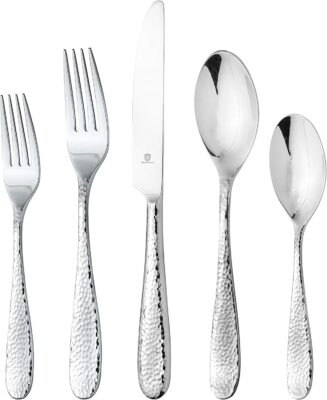
DANIALLI Stainless Steel Silverware Set
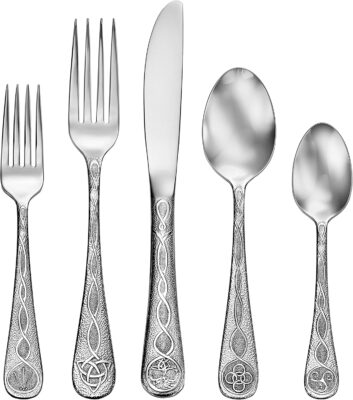
Liberty Tabletop Celtic Silverware Set
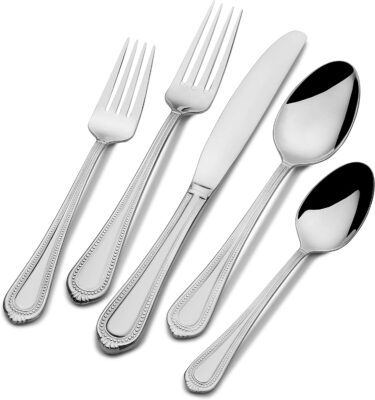
Mikasa Regent Bead Silverware Set
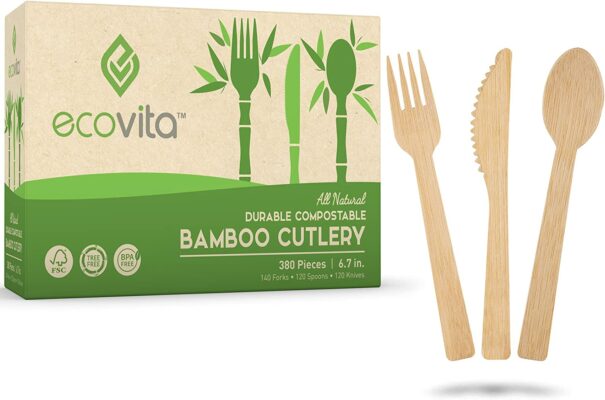
Bamboo Silverware Set
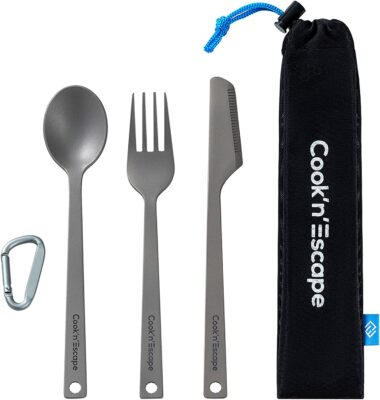
COOK’N’ESCAPE Titanium Silverware Set
Factors to Consider When Buying Non-Toxic Silverware
When purchasing non-toxic silverware, there are various factors to consider that can help you to choose the best option for your needs.
Below are some of the factors to consider when buying non-toxic silverware.
Dishwasher Safe
If you are someone who prefers the convenience of using a dishwasher, it is essential to choose silverware that is dishwasher safe. Many non-toxic silverware options like stainless steel, titanium, and food-grade silicone are dishwasher safe, making them an excellent choice for busy households.
Rust-Proof
To ensure that your silverware lasts long, it is crucial to choose a rust-proof option. Rust can make silverware look old and unsightly, which can also be a health hazard if consumed. Non-toxic silverware that is rust-proof will be a more reliable option in the long run.
Heavy-Duty
Non-toxic silverware that is heavy-duty can be an excellent investment for those who want a long-lasting option. Heavy-duty silverware is usually made from high-quality materials and is designed to withstand the wear and tear of everyday use.
Nickel-Free
For people with allergies or sensitivities to nickel, it is essential to choose silverware that is nickel-free. Nickel-free silverware is less likely to cause allergic reactions or skin irritations, making it a safer choice for those with nickel sensitivities.
Inexpensive
Non-toxic silverware can be affordable, and many options are available at various price points. Choosing non-toxic silverware that is within your budget and provides value for money is essential.
Steps to use Non-toxic silverware
Using non-toxic silverware is an easy and practical way to promote a healthy and eco-friendly lifestyle. By following a few simple steps, you can enjoy your meals with the peace of mind that your utensils are safe and free from harmful chemicals.
Here are some steps to use non-toxic silverware:
- Wash the Silverware: Before using your non-toxic silverware for the first time, make sure to wash it thoroughly. Use mild soap and warm water to clean the utensils, and dry them with a soft cloth.
- Store the Silverware: Once you have cleaned your non-toxic silverware, store it in a safe and dry place. You can use a utensil holder or a drawer organizer to keep your silverware organized and easy to access.
- Use Proper Utensils: Depending on the type of non-toxic silverware you have, use the appropriate utensils to avoid damage or scratches. For example, wooden or bamboo silverware is softer than stainless steel, so use wooden or silicone utensils to avoid damaging the surface.
- Avoid Harsh Chemicals: When cleaning your non-toxic silverware, avoid using harsh chemicals or abrasive cleaning pads that can damage the surface. Instead, use mild soap and warm water to clean your silverware, and dry it with a soft cloth.
- Check for Rust: If you have stainless steel silverware, check it regularly for rust. While non-toxic stainless-steel silverware is rust-resistant, it can still rust over time if not cared for properly. To prevent rust, dry your silverware thoroughly after washing it and avoid leaving it in water for long periods.
By following these simple steps, you can use non-toxic silverware safely and effectively. Whether you prefer bamboo, wood, glass, ceramic, or stainless-steel silverware, non-toxic options are available to meet your needs and preferences.
What Are the Common mistakes When Using Silverware?
Silverware is an essential tool for any dining experience, but it’s easy to make mistakes when using it. Knowing how to use silverware correctly ensures a pleasant and enjoyable dining experience.
Here are some common mistakes that people make when using silverware and how to avoid them.
Holding silverware incorrectly
Holding silverware incorrectly is the most common mistake people make. The correct way to hold silverware is by placing the handle between the thumb and the index finger and resting the middle finger on the back of the handle.
Using the wrong silverware for the course
Different silverware is used for different courses in a meal, and using the wrong silverware is a common mistake. For example, a soup spoon is used for soup, a salad fork for salads, and a dessert spoon for desserts.
Improper placement of silverware
Improper placement of silverware on the table can be confusing for the guests. The general rule is to place silverware in the order it will be used, with the utensils for the first course on the farthest side of the plate and the utensils for the last course closest to the plate.
Not knowing how to signal the end of the meal.
Once you’ve finished your meal, you should signal the server that you’re done. The correct way to signal this is by placing the silverware at a diagonal across the plate, with the handles at the 4 o’clock position and the tips pointing to the 10 o’clock position.
Not cleaning the silverware correctly.
Cleaning the silverware incorrectly is also a common mistake. If you want your silverware to last longer, you should avoid using abrasive cleaners or steel wool, as they can scratch the surface of the silverware. Instead, use a soft cloth and mild soap to clean it.
By avoiding these common mistakes, you can enjoy your meals to the fullest and impress your guests with proper etiquette.
Conclusion
The Ultimate Guide to Non-Toxic Silverware provides an in-depth look into non-toxic silverware, including its definition, benefits, and the best materials to use for non-toxic silverware.
It provides a comprehensive list of the best materials for non-toxic silverware, including stainless steel, titanium, bamboo, wood, glass, and ceramic.
Additionally, it covers the factors to consider when purchasing non-toxic silverware, such as dishwasher safety, rust-proofing, heavy-duty construction, nickel-free materials, and affordability.
Finally, it provides tips on how to use and avoid common mistakes when using silverware.
